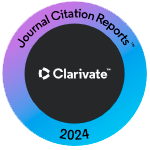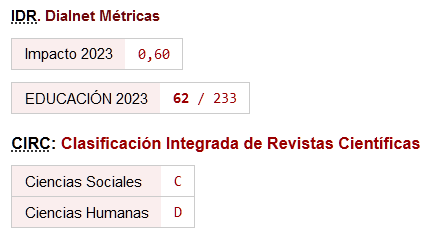Prueba de práctica diaria
efectos sobre el rendimiento matemático en la resolución de operaciones fundamentales en fracciones
DOI:
https://doi.org/10.46661/ijeri.4519Palabras clave:
Evaluación, Educación, Pruebas frecuentes, Rendimiento matemático, PedagogíaResumen
Este estudio experimental evaluó los efectos de implementar la prueba de práctica diaria en la resolución de operaciones fundamentales en fracciones como una de las deficiencias de los estudiantes de matemáticas. Además, los resultados de las pruebas de rendimiento revelan que una de las debilidades de los estudiantes es el dominio y la fluidez computacional para resolver problemas que involucran fracciones. El estudio tuvo como objetivo comparar las pruebas diarias y la revisión convencional como una herramienta para dominar los conceptos que involucran fracciones. Esto se realizó a través de la prueba previa y posterior en el rendimiento de los estudiantes antes y después de estar expuestos a las pruebas diarias. Los encuestados se agruparon según la revisión convencional y un grupo expuesto a las pruebas diarias durante ocho semanas. Dos clases distintas; Los grupos experimentales (n = 75) y de control (n = 75) fueron elegidos al azar. Los resultados revelaron que los estudiantes en ambos grupos mostraron un rendimiento por debajo del promedio en la prueba previa, pero manifestaron una diferencia significativa en la media real en la prueba posterior. Ambos grupos mostraron una mejora significativa en la resolución de operaciones fundamentales en fracciones. Además, el logro de los estudiantes bajo la Prueba de práctica diaria mostró un rendimiento superior al promedio y ayudó significativamente a mejorar el dominio de los estudiantes para resolver las operaciones fundamentales en fracciones. El documento concluye que las pruebas diarias tienen un impacto positivo en el dominio de los estudiantes y han mostrado una mejora en sus hábitos de estudio como se evalúa con frecuencia.
Descargas
Citas
Adkins, J. K., & Linville, D. R. (2017). Testing frequency in an introductory computer programming course. Information Systems Education Journal, 22, http://iscap.info.
Alghazo, Y. M., & Alghazo, R. (2017). Exploring common misconceptions and errors about fractions among college students in Saudi Arabia. International education studies, 10 (4), 133-140, doi:10.5539/ies.v10n4p133 .
Bayat, A., Jamshidipour, A., & Hashemi, M. (2017). The beneficial impacts of applying formative assessment on iranian university students' anxiety reduction and listening efficacy. International Journal of Languages' Education and Teaching, 5, 1-11.
Bentley, B., & Bosse', M. J. (2018). College students' understanding of fraction operations. International electronic journal of mathematics education, 13, (3) 233-247, http://doi.org/10.12973/iejme/3881
Brown, G. (2007). Fraction Proficiency and Success in Algebra: What does research say? Australian Mathematics Teacher, 63(3), 23-30.
Bush, S. B., & Karp, K. S. (2013). Prerequisite algebra skills and associated misconceptions of middle grade students: A review. The Journal of Mathematical Behavior, 32, 613-632, http://dx.doi.org/10.1016/j.jmathb.2013.07.002.
Cavendish, M. (2013). Singapore Math: A Visual Approach to Word Problems. Houghton Mifflin Harcourt Education, pp. 1-6.
De Castro, B. V. (2008). Cognitive Models: The Missing Link to Learning Fraction Multiplication and Division. Asia Pacific Education Review, 9, 101-112.
Dempster, F. (1981). The Spacing Effect. A Case Study in the Failure to Apply the Results of Psychological Research. American Psychologist,43 (8) 627-634.
DepEd. (2015). Policy Guidelines on Classroom Assessment for the K to 12 Basic Education Program. DO 8, s. 2015. Retrieved from Republic of the Philippines Department of Education: http://www.deped.gov.ph/orders/do-8-s-2015
Deringol, Y. (2019). Misconceptions of Primary School Students about the Subject of Fractions. International Journal of Evaluation and Research in Education, 8(1), 29-38 DOI: 10.11591/ijere.v8.i1.
Dewey, J. (1938). Experience and Education. New York: MacMillan.
Dios, A. D. (2013, July 20). Philippine Basic Education. http://www.philippinesbasiceducation.us/2013/07/the-national-achievement-test-in.html
Drowns, R. L. (1986). Effects of Frequent Testing. Journal of Educational Research, 85 (2),89-99.
Felderman, T. A. (2014). Preliminary Analysis of Interteaching's Frequent Examinations Component in the Community College Classroom. Journal of College Teaching & Learning, 11 (4), 149-156.
Foundation for Critical Thinking. (2013). The Critical Thinking Community: http://www.criticalthinking.org/pages/critical-thinking-where-to-begin/796
Ghorbani, M. (2017). Quizzes in every other session improve undergraduate EFL learners' pronunciation achivement. Advances in language and literacy studies, 8 (5), 65-70, http://dx.doi.org/10.7575/aiac.alls.v.8n.5p.65
K to 12 Curriculum Guide. (2012). DepEd K to 12 Curriculum Guide in Mathematics: http://www.gov.ph/downloads/2012/01jan/MATHEMATICS-K-12-Curriculum-Guide.pdf
Kwan, F. (2011). Formative Assessment: The one-minute paper VS. the daily quiz. Journal of Instructional Pedagogies, 5, 1-8.
Kwan, F. B. (2018). Daily quiz-for engagement and learning. Journal of instructional pedagogies, 21, 1-10.
Lang, J. M. (2016). Small Teaching: Everyday Lessons from the Science of Learning. Jossey-Bass A Wiley Brand.
Magliaro, S. G., Lockee, B. B., & Burton, J. K. (2005). Direct Instruction Revisited: A Key Model for Instructional Technology. ETR&D,53 (4), 41-55.
Mines Jr., R. O. (2014). The impact of testing frequency and final exams on student performance. American Society for Engineering Education Southeast Section Conference. ASEE Southeastern Section Annual Conference.
Mohamed, S., Teoh, S.-H., Singh, P., & Kor, L.-k. (2019). Learning to make sense of fractions: some insights from the malaysian primary 4 pupils. International electronic journal of mathematics education, 14 (1), 169-182, https://doi.org/10.29333/iejme/3985.
Momeni, A., & Barimani, S. (2012). The Effect of Testing Frequency on Iranian Pre-Intermediate EFL Learners' Language Achievement. Journal of Academic and Applied Studies, 2(10), 76-87.
Pennebaker, J., Gosling, S., & Ferrell, J. (2013). Daily online testing in large classes: Boosting college performance while reducing he achievement gaps. Institute of Education Sciences. PLoS ONE 8 (11), e79774. https://doi.org/10.1371/journal.pone.0079774
Reese, H. W. (2011). Learning by Doing Principle. Behavioral Development Bulletin, 17(1), 1–19. https://doi.org/10.1037/h0100597
Roediger, H. L., Putnam, A. L., & Smith, M. A. (2011). Ten Benefits of Testing and Their Applications to Educational Practice. Psychology of Learning and Motivation, 55, 1-36.
Schugel, M. J. (2016). The effects of frequent formative assessment and feedback on summative assessment. St. Catherine University repository website, htps://sophia.stkate.edu/maed/193.
Siegler, R. S., Bailey, D. H., Zhou, X., & Fazio, L. (2013). Fractions: The new frontier for theories of numerical development. Trends in Cognitive Sciences, 17(1), 13-19. https://doi.org/10.1016/j.tics.2012.11.004
Staddon, J. R., & Cerutti, D. T. (2002). Operant Conditioning. Annual Review of Psychology, 1-22.
Torbeyns, J., Schneider, M., Xin, Z., & Siegler, R. (2014). Bridging the gap: Fraction Understanding is Central to Mathematics Achievement in Students from Three different Continents. Learning and Instruction, 37, 5.13.
Unlu, M., & Ertekin, E. (2012). Why do pre-service teachers pose multiplication problems instead of division problems in fractions? Procedia-Social and Behavioral Sciences, 46, 490-494.
Waite, J. (2007). Weekly Quizzing Really Works! Online Software Makes It Easy. Tech Directions, 66 (7), 16-21.
Willingham, D. (2013). Learning and the "Testing Effect": Research Inside Classrooms. Retrieved from Philippine Basic Education: http://www.philippinesbasiceducation.us/2013/07/learning-and-testing-effect-research.html
Willis, J. (2017). AASA The School Superintendents Association. Retrieved from AASA School Administrator: https://my.aasa.org/AASA/Resources/SAMag/2017/Sep17/Willis.aspx
Wolf, P. J. (2007). Academic Improvement Through Regular Assessment. Peabody Journal of Education, 82(4), 690–702
Yigit, E., Kiyici, F., & Cetinkaya, G. (2014). Evaluating the Testing Effect in the Classroom: An Effective Way to Retrieve Learned Information. Eurasian Journal of Educational Research, 54, 99-116.
Zgraggen, F. D. (2009). The Effects of Frequent Testing in the Mathematics' Classroom. Masters’ Thesis, University of Wisconsin-Stout, Menomonie, WI.
Descargas
Publicado
Cómo citar
Número
Sección
Licencia
Derechos de autor 2022 Jun Carl Alenton

Esta obra está bajo una licencia internacional Creative Commons Atribución-NoComercial-SinDerivadas 4.0.












